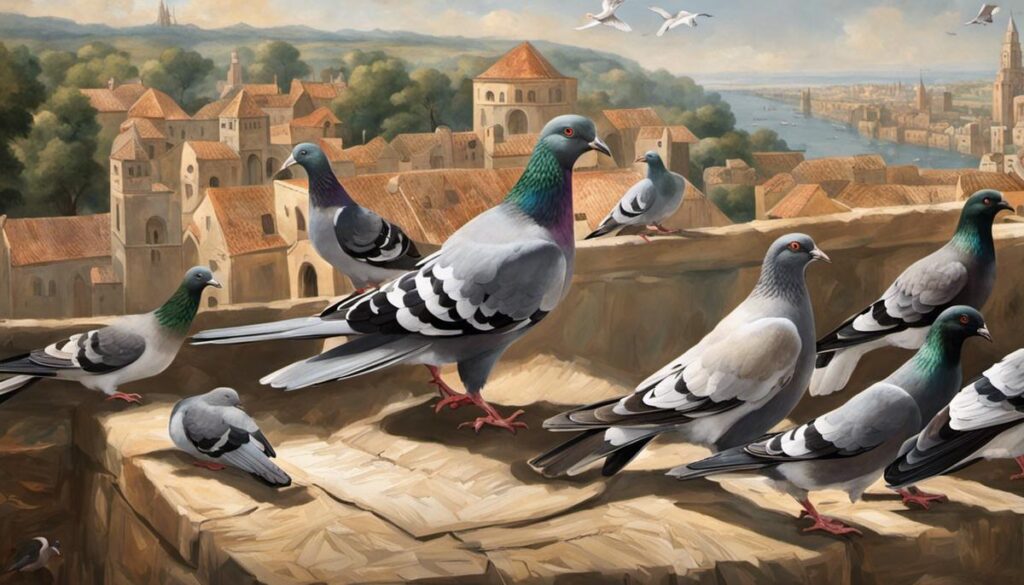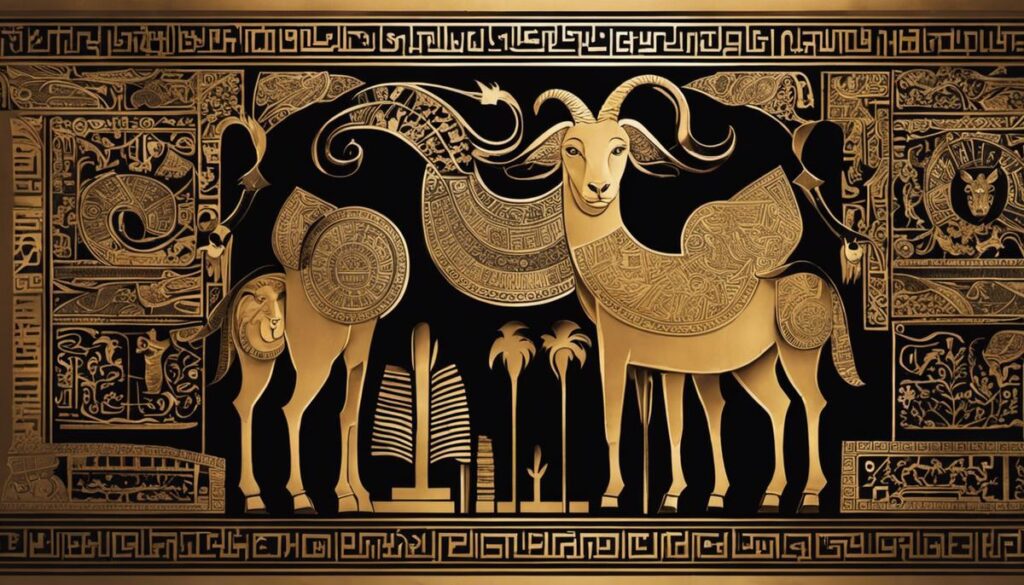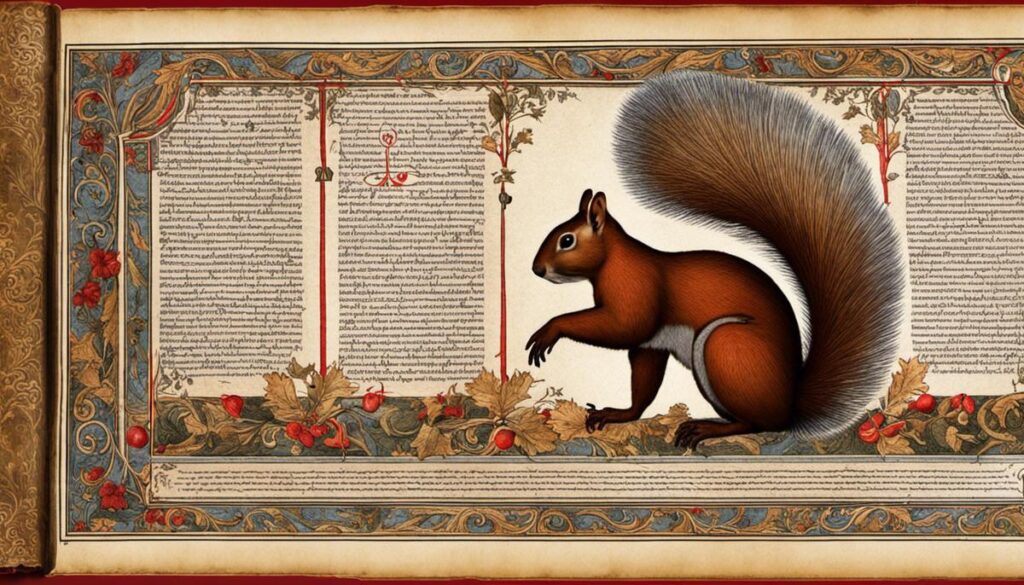In the intricate tapestry of biblical symbolism, the pigeon holds a unique place, acting as a humble but profound manifestation of divine intentions. Pigeons, with their ubiquitous presence in biblical lands and times, have found their way into several scriptures, often symbolizing purity, sacrifice, and divine communication. This exploration delves into the historical context of pigeons in biblical times, scrutinizing their societal role and practical uses that lent them a symbolic reputation. As we proceed to examine specific biblical references incorporating pigeons, we endeavor to decode any underlying symbolism these birds carry within these hallowed narratives. A segue into understanding the psychology of dream interpretation provides us with a foundation on dream symbols from various cultural and anthropological perspectives. All these fragments of information work in harmony to pave the path for a comprehensive interpretation of what it might mean when one dreams of pigeons from a biblical perspective.
Historical Context of Pigeons in Biblical Times
The Unsung Heroes of the Bible Era: Exploring the Cultural and Historical Role of Pigeons
In the annals of history, countless creatures have played significant roles, often extolled and meticulously documented — however, the humble pigeon has been remarkably overlooked. This is a regrettable oversight because these birds, appearing rather innocuous and insignificant, have in fact influenced the Bible era and its socio-cultural fabric significantly.
Pigeons and doves, belonging to the same bird family (Columbidae), are depicted widely across various Biblical narratives, both Old and New Testament, symbolizing holiness, love, and sometimes divine intervention. Their frequent appearances are a testament not just to their spiritual significance, but also to their ubiquitous presence in the day-to-day life of the biblical era.
In a practical sense, pigeons played a paramount role in sustaining lives by serving as an inexpensive, readily available source of protein during those times. Their nutritious meat provided sustenance for ordinary citizens and their eggs supplemented the diet of many. In the Levitical law of the Old Testament, the offering of two young pigeons or doves was legislated for those unable to afford a lamb, underlining their availability and affordability, thereby ensuring widespread accessibility of sacrificial rituals.
Furthermore, their droppings or ‘guano’ were utilized as a potent fertilizer that significantly enhanced agricultural productivity in a region with frequently hostile climatic conditions. The importance of this cannot be understated in a largely agrarian society that depended on the fertility of its lands for survival and prosperity.
Among the pantheon of biblical pigeons, the most reputed is undoubtedly the dove that Noah sends forth from the ark, signaling the receding of the Great Flood and newfound hope. Their significance is further reinforced on many occasions, such as when a dove is mentioned descending upon Jesus during his baptism, symbolizing the Holy Spirit. This has entrenched the pigeon, or dove, as symbol of peace and purity in the contemporary psyche.
Aside from agriculture and religious rites, pigeons also offered one of the first prototypes of long-distance communication through pigeon post. Historically, their keen homing abilities were exploited for transferring messages across distances. Although this is not directly mentioned in biblical narratives, the existence of such a practice at that time can be extrapolated from the Assyrian and Egyptian hieroglyphs and ancient Greek correspondence.
In summary, the role of pigeons in the Bible era extends far beyond merely a symbol of divine spirit. Whether in nourishing the masses, boosting agricultural output, or even facilitating communication, their contributions permeate several aspects of daily life and survival. They are, indeed, unsung heroes of the past, deserving both historical and contemporary recognition.
Therefore, it can be surmised that the understated pigeon has played significant roles, from the mundane to the extraordinary, during the Bible era. Our perception of this wide-ranging impact should not be limited to viewing pigeons merely as ornamental creatures in biblical narratives, but rather as active contributors to ancient civilizations. The pigeon, in this light, not only enhances our understanding of life during those times but also highlights the interconnectedness of humans and their environment throughout history.

Biblical References to Pigeons
Building upon the abovementioned discussions, it is necessary to delve deeper into the specific biblical passages involving pigeons and the significant symbolic representation embodied by these agile creatures.
To comprehend the symbolic significance of pigeons in the Bible, one must first take into consideration the unique biological characteristics of pigeons. These creatures possess innate homing abilities, allowing them to return to their nests over vast distances, which is why they were used in biblical times as primary means of communication over great distances. However, the symbolism of pigeons extends beyond their practical and utilitarian uses; pigeons symbolically represent spiritual themes such as peace, love, and sacrifice in biblical narratives.
One of the most standout references to pigeons in the Bible proves to be Leviticus 12:6-8. This biblical passage narrates the purification ritual of a woman after childbirth, especially in circumstances where the woman cannot afford a lamb, she can bring two pigeons or two doves as a burnt offering and a sin offering, respectively. This points towards the symbolic representation of pigeons as instruments of penance and redemption in biblical times.
Further literary analysis of biblical texts points toward another significant instance involving pigeons. In the Gospel of Luke (2:24), the Holy Family offers a pair of pigeons or doves for purification after the birth of Jesus Christ. This offers a crucial dimension to the understanding of pigeons in the Bible, associating their image with humility, sacrifice and divine grace, and underscores their pertinence in religious rites and traditions.
The role of the pigeon within biblical passages potentially symbolizes the human condition, with its penchant for returning home reflecting spiritual journeying and the human aspiration for salvation. Their repeated use in offerings emphasis their role as mediators between the sacred divine and mundane human existence; they stand as symbols of the aspirational journey towards celestial sanctity.
To conclude without a comprehensive summary, it is imperative to understand the fundamental symbolic representation of pigeons within biblical passages. It is not mere coincidence that pigeons feature prominently within sacred texts – they embody themes of sacrifice, redemption, and divine grace, interconnecting with humans’ spiritual journeys. The academic exploration into the symbolic importance of these creatures greatly enriches our understanding of biblical literature and further elucidates our comprehension of mankind’s historical, cultural, and religious narratives.

Interpreting Pigeons in Dreams
Shifting focus to the psychological interpretation of pigeons in dreams, it is crucial to delve into the underlying spectrum of dream symbolism. The scientific field of dream interpretation, while inherently speculative, is rooted in psychoanalysis, a discipline pioneered by Sigmund Freud and Carl Jung. These luminaries posited that dreams serve as an outlet for suppressed thoughts and emotions, with each symbol bearing significance unique to the dreamer’s subconscious.
Identifying the pigeon’s dream symbolism then entails examining its predominant real-world connotations, as outlined in the preceding discourse on pigeon roles in biblical times. In dreams, a pigeon’s appearance could signify humility and simplicity, reflecting the biblical depiction of the bird. Accordingly, dreamers might interpret such imagery as a call to embrace these virtues in their waking life.
Jung, in his work on dream analysis, emphasizes the collective subconscious, comprising universally recognized symbols known as archetypes. Pigeons, owing to their widespread historical and spiritual significance, arguably constitute one such archetype. As such, seeing a pigeon in a dream might invoke communal themes of peace and unity, resonating with the bird’s global symbolism.
From a cultural viewpoint, pigeons in dreams can project varying interpretations contingent on specific cultural contexts and traditions. In some Asian cultures, for instance, white pigeons portend well-being and prosperity. Therefore, for a person hailing from these cultures, dreaming about pigeons could herald auspicious events or opportunities.
Conversely, in several western cultures, pigeons are often associated with messages or news owing to their historical uses as message carriers. Hence, their appearance in dreams might signal impending information or revelations. Given their strong homing instincts, they could also symbolize a longing for home or connections with loved ones.
Examining the pigeon as a dream symbol underscores the profound interconnectedness between our internal psychological landscapes and broader historical, cultural, and spiritual contexts. Such analysis embodies the dedication to rigorous exploration traditionally associated with academia and research, enriching our understanding of the intricate psychological forces at play within dreams. The spotlight on pigeons also serves to remind of their oft-underappreciated significance in shaping human history and culture, laying bare the depth of our symbiotic relationships with the natural world. To parse dream symbolism is to navigate a multi-dimensional maze. Certainly, the path is seldom straightforward, but the pursuit of knowledge is inherently an intricate dance with uncertainty.

Pigeons in Dreams: A Biblical Perspective
Transitioning into the biblical realm from the depths of psychoanalysis, dreaming of pigeons assumes a certain spiritual undertone too. Dreams, being complex multidimensional phenomena, are believed by many to hold spiritual clues. Biblical interpretation of such dreams often navigates towards spiritual revelations and divine messages.
The dream about pigeons could likely bear a spiritual significance within the biblical context, drawing from the rich tapestry of symbolism that the pigeon, or dove, represents. Pigeons in dreams can echo the same sentiments of peace, grace, and divinity that they symbolize in the biblical narratives. The pigeon in such dreams might be seen as a harbinger of peace, bringing calm and serenity to troubled minds, much like the dove returning to Noah with an olive branch, signaling the end of the cataclysm and the beginning of a peaceful, new world order.
Some biblical scholars and dream interpreters suggest that pigeons appearing in dreams signify the divine presence or message. Thus in dreams, pigeons could be read as divine messengers, much akin to their use in the Bible, where they served as mediums of communication – a tool of connectivity between the terrestrial and the celestial.
Subsequently, pigeons in dreams can also be perceived as signals of a spiritual journey or transformation. This interpretation is akin to the idea of pigeons being used as offerings in purification rituals in Levitical codes. Hence, a dream about pigeons could potentially signal a phase of purification or spiritual progress, inviting the dreamer towards introspection and personal growth.
Moreover, the biblical account of the Holy Family offering pigeons for purification after the birth of Jesus testifies to the pigeon’s association with innocence, humility, and redemption. Dreams featuring pigeons, in this regard, might reflect the dreamer’s yearning for innocence, humility, or divine grace.
In certain contexts, dreaming of pigeons might also symbolize freedom or the desire for it. Echoing the restful cooing of the pigeon, the dream might be a call to live in harmony with others, echoing the values of peace, love, and sacrifice that pigeons symbolize in biblical narratives.
This spiritual lens is not, however, a one-size-fits-all and the interpretation heavily depends on the circumstances of the dream itself. The physical state of the pigeon, its activities, the dynamics between the dreamer and the bird— all contribute to the meaning of the dream. Thus, it is crucial to consider the individual’s personal connections with pigeons, their spiritual and cultural beliefs, and the specific context of the dream when interpreting what dreams about pigeons might signify.
In conclusion, dreams about pigeons could indeed hold profound spiritual significance within the biblical framework. They serve as potent symbols, presenting nuanced spiritual insights that connect the dreamer with deeper awareness, encouraging transformations, miracles, divine messages, and human journeying. Through dream interpretation, we can appreciate a greater understanding of how the symbolic importance of pigeons bridges the gap between somnolent visions and waking life, the mundane and the divine, the known and the mysterious. Such explorations bring forth the integral role of pigeons, not just as historical artifacts or active biological subjects, but as connectors across realms of reality and spiritual dimensions.

Having navigated through historic events, biblical narratives, psychologic perspectives, and cultural practices, we are inclined to perceive the significant role pigeons play as symbols in dreams. Their gentle appearance in our dreams subtly mirrors the purity of their biblical representation and the potency of their societal presence in biblical times. As we have discovered, interpreting dreams that feature these birds may unveil profound spiritual messages. The symbolism attached to the pigeon in dreams respectively intertwines with the echoes of its past, the biblical stories it has featured in, and its spiritual connotations. By understanding these attributions, one can potentially decipher dreams featuring pigeons more meaningfully, weaving in personal perspectives into a broadly historical, cultural, and spiritual context.








